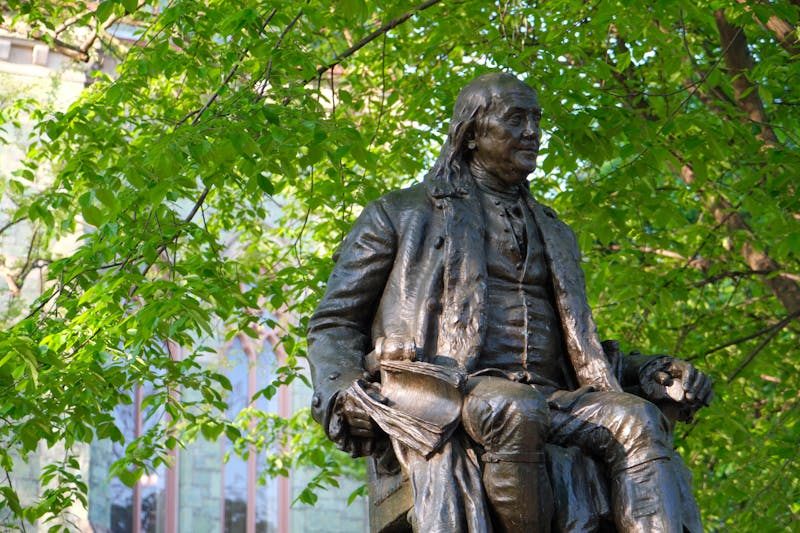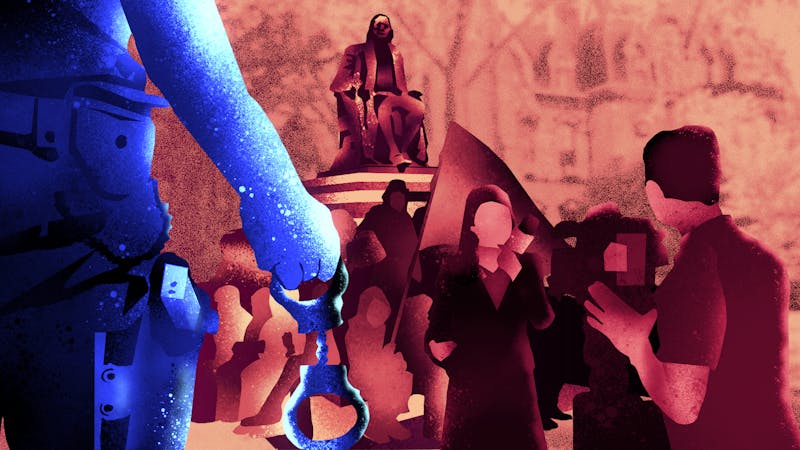
Columnist Mritika Senthil comments on the impact of Penn's Temporary Expression Guidelines on free press.
Credit: Nathaniel Babitts“A decree imposing temporary restrictions on the freedom of the press was signed … and it was stipulated that the Committee was to concern itself with only the press in general and was not to intrude in censorship matters.”
You’re probably familiar with this excerpt. After all, it very well describes Penn’s recently announced temporary open expression guidelines, particularly a provision relating to media access. The policy states that news media “may be asked to limit filming … to allow Penn’s Division of Public Safety to maintain campus security.”
Therefore, the University has not greenlit some sort of Orwellian measure that suppresses dissenting opinions.
Except, the initial excerpt was from the account of a Soviet-era journalist on the growth of the USSR’s Central Board for Literature and Press Affairs, or more colloquially, Glavit. Initially implemented by Vladimir Lenin as a temporary measure to address security concerns during the post-revolution period, Glavit became a self-perpetuating censorship apparatus that drove the Soviet Union toward its infamous authoritarianism.
More simply put, a decree not too different from Penn’s open expression guidelines was ultimately used to legally suppress dissent. To clarify, this analogy was not my nihilist attempt to suggest that Penn is doomed. However, critics have argued that the policy is a “blatant violation” of the First Amendment right to “[record] police officers [in the context] of their job.” With wide-ranging, or “blanket,” discretion granted by the policy, administrators could pivot to more anti-intellectual roles through which they suppress legitimate criticism.
Obviously, I can’t equate the power of a private institution like Penn with foreign national governments. In the United States, all individuals have the right to free speech and due process. This means that many internal statutory checks are in place to protect an individual’s rights at Penn. But more importantly, it is difficult for any leader to act with impunity because of public scrutiny.
For instance, in the case of former Penn President Liz Magill’s resignation, donor influence was a factor in the change of leadership. However, students at the time also pushed for change through several other avenues, whether by organizing public awareness campaigns and boycotts or launching petitions on social media. Currently, our partisanship blinds us from recognizing the importance of collectively holding our institutions accountable. However, student activism has led to the creation of the University Task Force on Antisemitism as well as advisory groups on Muslim, Arab, and Palestinian student experiences. Penn also launched review of existing policies on discrimination and harassment, including the aforementioned open expression guidelines. So, we can see that Penn students, regardless of their political standings, have improved the campus experience for all through advocacy. Let’s extend that same level of scrutiny to our open expression guidelines.
We joined Penn knowing that it is a place where intellectual debate thrives. So the bottom line is we all need to hold our institutions accountable. The temporary open expression guidelines highlight the ever-dynamic balance between protecting privacy and fostering dialogue. Although campus discourse has diminished with the end of the semester, we should not gloss over the critical contracts and agreements passed by the University administration — otherwise, we risk turning our present into a dystopian future.
MRITIKA SENTHIL is a sophomore from Columbia, S.C. Her email is mritikas@upenn.edu.
The Daily Pennsylvanian is an independent, student-run newspaper. Please consider making a donation to support the coverage that shapes the University. Your generosity ensures a future of strong journalism at Penn.
Donate










